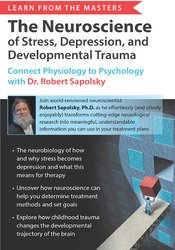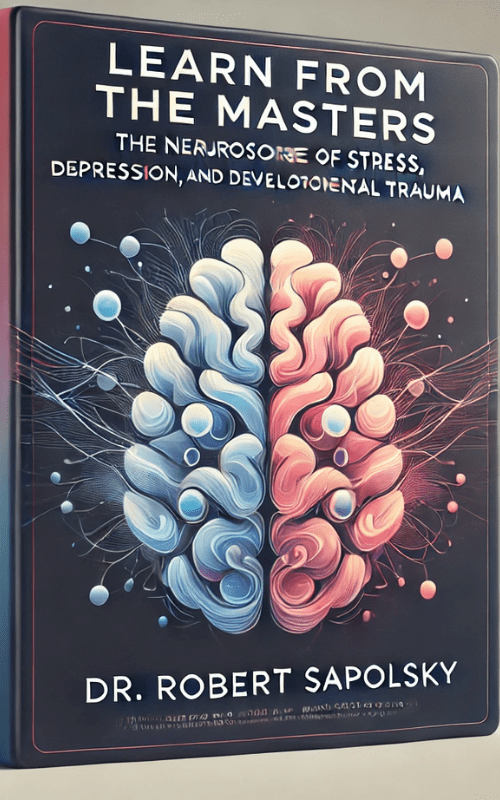Learn from the Masters-The Neuroscience of Stress, Depression and Developmental Trauma – Connect Physiology to Psychology with Dr. Robert Sapolsky – Robert Sapolsky
Learn from the Masters-The Neuroscience of Stress, Depression and Developmental Trauma – Connect Physiology to Psychology with Dr. Robert Sapolsky – Robert…
Overview
Salepage check: Learn from the Masters-The Neuroscience of Stress, Depression and Developmental Trauma
Author: Connect Physiology to Psychology with Dr. Robert Sapolsky – Robert Sapolsky
- Faculty:
- Robert Sapolsky
- Duration:
- 2 Hours 57 Minutes
- Format:
- Audio and Video
- Copyright:
- Apr 12, 2018
Description
In this captivating recording, you’ll have the rare opportunity to learn from Dr. Robert Sapolsky, one of the world’s leading researchers on the physiology and psychology of stress.
Dubbed the “world’s funniest neuroscientist” (Salon.com), Dr. Sapolsky will guide you through physiological explanations for stress and depression, interconnect the fields of psychology and neurobiology, and strengthen the case for brain-based therapeutic treatments.
Two hours of an enlightening and entertaining lecture from Dr. Sapolsky are followed by a unique one-hour interview with clinical psychologist, international speaker, and author Dr. Jennifer Sweeton. In what is sure to be a lively, informative, and thought-provoking discussion, doctors Sapolsky and Sweeton will cover a variety of topics about stress, depression, and trauma, and tie it all back to the strategies and techniques that you can use in the office with your clients each day.
Key Benefits of Watching:
- 3-hour format gives you the chance to learn from a remarkable and memorable expert without a day-long commitment.
- Dr. Sapolsky brings humor and humanity into his discussions of research and physiology, all while making the science of the brain-body connection to our psychological well-being accessible and useable.
- Learn to apply neuroscientific principals to your practice to enhance clinical outcomes.
- Integrate research findings into treatment with proven therapeutic methods based in mindfulness, positive psychology, and somatic psychologies.
Handouts
| Manual (2.54 MB) | 33 Pages | Available after Purchase |
Outline
- What Does Biology Have to do With It?
- The Nature of Stress and the Stress Response
- The nature of stress
- Homeostasis
- The dichotomy between short-term and long-term stress exposure
- The stress response
- Hormones and autonomic pathways
- How the long-term stress response impacts the brain and body
- The Nature of Stress and the Stress Response
- Clinical Manifestations of Chronic Stress in Your Clients
- Impaired declarative memory
- Vulnerability to anxiety and fear conditioning
- Impaired executive functioning
- Impaired empathy
- The Interplay of Stress, Depression and
- Developmental Trauma
- The Neurochemistry and Neuroanatomy of Stress, Depression and Childhood Adversity
- How and why stress becomes depression
- Neurobiological mechanisms
- The psychological components of stress
- Learned helplessness as a model for depression
- Stress as a bridge linking the biological and psychological features of depression
- The genetics of affective resilience in the face of stress
- Childhood adversity as a risk factor
- How traumatic stress shifts the trajectory of brain development
- Clinical implications
- The Neurochemistry and Neuroanatomy of Stress, Depression and Childhood Adversity
- Connecting Biology to Psychology in Your Clinical Practice: An Interview with Dr. Jennifer Sweeton
- When is stress good?
- How can neurobiology help you to determine treatment methods and set goals?
- Coping with stress – social isolation vs. social affiliation
- Techniques that impact stress pathways, the stress response and the brains limbic regions
- Strategies to create resilient brains that are less susceptible to stress-based damage
- Gratitude interventions for stress and depression
Faculty
Robert Sapolsky, Ph.D. Related seminars and products: 1
Dr. Robert Sapolsky, Ph.D., is a MacArthur “Genius” Fellow, a professor of biology and neurology at Stanford University, and a research associate with the Institute of Primate Research at the National Museum of Kenya. In 2008, National Geographic & PBS aired an hour-long special on stress featuring Dr. Sapolsky and his research on the subject. In addition to A Primate’s Memoir, which won the 2001 Bay Area Book Reviewers Award in nonfiction, he has written three other books, including The Trouble with Testosterone, Why Zebras Don’t Get Ulcers, and Monkeyluv and Other Essays on our Lives as Animals. Dr. Sapolsky was awarded Rockefeller University’s Lewis Thomas Prize for Writing about Science for 2008. His articles have appeared in publications such as Discover and The New Yorker, and he writes a biweekly column for the Wall Street Journal entitled “Mind & Matter.” His new book is Behave: The Biology of Humans at Our Best and Worst (Penguin Press May 2017).
Speaker Disclosure:
Financial: Robert Sapolsky is a professor at Stanford University. He is a research associate at the National Museum of Kenya. Dr. Sapolsky receives a speaking honorarium from PESI, Inc.
Non-financial: Robert Sapolsky has no relevant non-financial relationship to disclose.
Curriculum
FAQs
Requirements
- Basic Understanding of Psychology and Neuroscience: A foundational knowledge in psychology or neuroscience will enhance the comprehension of complex concepts discussed.
- Interest in Clinical Practice: Beneficial for those in healthcare, mental health, or trauma-informed practices.
- Commitment to Learning: Participants should be ready to engage in an in-depth exploration of stress, trauma, and their developmental impacts.
Features
- In-depth Analysis of Neuroscience and Psychology: Explore how stress and trauma influence brain development and mental health.
- Real-World Applications: Practical applications of course concepts for clinical and therapeutic settings.
- Accessible Expert Instruction: Led by Dr. Robert Sapolsky, a renowned expert in neuropsychology, offering a unique educational experience.
- Digital Accessibility and Cost Savings: Get the digital course at 80% off, with all core content accessible online without additional physical resources.
Target audiences
- Mental Health Professionals: Psychologists, counselors, therapists, and social workers seeking neuroscience-backed insights.
- Healthcare Practitioners: Physicians, nurses, and other healthcare providers looking to connect physiological responses to psychological outcomes.
- Educators and Researchers: Those involved in educational or research settings aiming to apply scientific findings in practical environments.
- Individuals Interested in Trauma Healing: Anyone invested in learning about trauma-informed practices and stress management for personal or professional growth.


